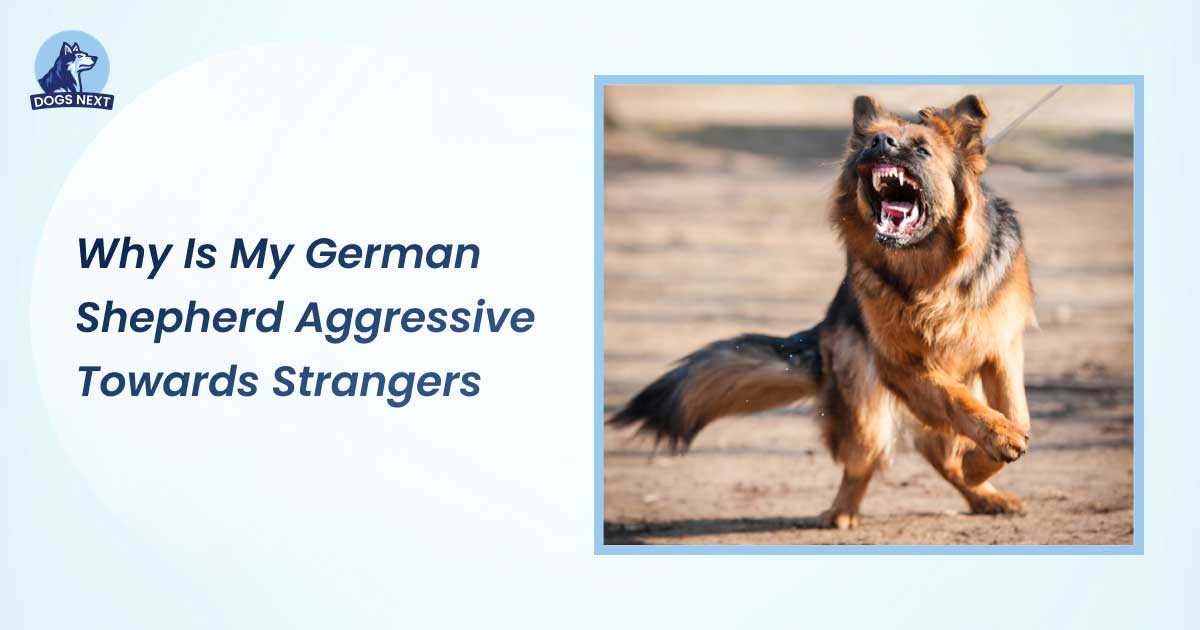Your German Shepherd may be aggressive towards strangers due to a lack of socialization or fear. Another reason could be protective instincts.
Aggression in German Shepherds can be a worrying behavior for dog owners. These intelligent and loyal dogs often exhibit protective instincts, which can sometimes manifest as aggression towards unfamiliar people. Proper socialization from a young age is crucial in helping them understand that strangers are not a threat.
Fear can also play a significant role in aggressive behavior, especially if the dog had negative experiences in the past. Training and positive reinforcement can help mitigate these issues, making your German Shepherd more comfortable and well-behaved around new people. Understanding the root cause of aggression is essential for developing an effective approach to managing and correcting this behavior.
Causes Of Aggression In German Shepherds
German Shepherds are known for their loyalty, intelligence, and protective nature. Yet, some owners might notice their German Shepherds becoming aggressive towards strangers. Understanding the causes of aggression in German Shepherds can help manage and reduce this behavior. Various factors contribute to this aggression, including protective instincts, lack of socialization, and fear-based reactions.
Protective Instincts
One of the primary German Shepherd aggression reasons is their strong protective instincts. These dogs have a natural tendency to protect their family and territory. This behavior can lead to aggression when they perceive a threat. Here are some key points to consider:
- Natural guardians: German Shepherds were bred to be guard dogs. This makes them naturally wary of strangers.
- Family bond: Their strong bond with their family can trigger protective behavior towards strangers.
- Territorial behavior: They may become aggressive if they feel their home is being invaded.
Understanding dog protective instincts is crucial. It helps to train your German Shepherd to differentiate between real threats and harmless strangers.
Lack Of Socialization
Lack of socialization is another significant cause of dog hostility. German Shepherds need to be exposed to various people, places, and situations from a young age. Insufficient socialization can result in aggressive behavior towards strangers. Consider the following:
- Early exposure: Puppies should meet different people and experience various environments.
- Positive experiences: Ensure interactions with strangers are positive to build trust.
- Ongoing socialization: Continue socialization throughout their life to reinforce good behavior.
A lack of socialization can make a German Shepherd feel anxious or threatened by unfamiliar faces. This can lead to aggressive reactions. Regular socialization helps in understanding dog aggression and managing it effectively.
Fear-based Reactions
Fear-based reactions are another common reason for aggression in German Shepherds. A dog might react aggressively when it feels scared or threatened. Several factors can contribute to fear-based reactions:
- Past trauma: Negative experiences with strangers can lead to fear and aggression.
- Genetics: Some dogs may be more prone to fear due to their genetic makeup.
- Lack of confidence: Insecure dogs are more likely to react aggressively out of fear.
Recognizing fear-based reactions is essential. It helps in creating a supportive environment for your dog. Training and positive reinforcement can reduce fear-based aggression. This approach builds their confidence and makes them feel safe around strangers.
Recognizing The Triggers Of Aggression
German Shepherds are known for their loyalty and protective nature. Sometimes, this can manifest as aggression towards strangers. Understanding the reasons behind this behavior is crucial for managing and mitigating it. Recognizing the triggers of aggression can help you address the root cause and create a safer environment for your dog and others.
Specific Types Of Strangers
German Shepherds may react differently to various types of strangers. Recognizing dog triggers can help you pinpoint what sets off your pet’s aggressive behavior. Some common triggers include:
- Uniformed individuals: Dogs may feel threatened by uniforms, such as those worn by mail carriers or delivery personnel.
- Children: The unpredictable movements and high energy of children can cause anxiety in dogs.
- Other animals: Dogs might be aggressive towards people who have pets with them, as they could perceive them as a threat.
Understanding these specific types of strangers can help you better manage your dog’s interactions. You might need to take extra precautions or training steps to reduce aggression in these scenarios.
Unfamiliar Environments
Unfamiliar environments can be another significant trigger for dog aggression. Stranger anxiety in dogs often increases in new or strange places. Your German Shepherd might feel the need to protect itself or you in these situations. Common unfamiliar environments include:
- New homes: Moving to a new house can be stressful for dogs, leading to increased aggression towards strangers.
- Parks: Busy parks with many new faces and scents can overwhelm your dog, triggering aggressive behavior.
- Veterinary offices: The unfamiliar sights, sounds, and smells of a vet’s office can cause stress and aggression.
To ease your dog’s anxiety in unfamiliar environments, consider gradual exposure and positive reinforcement techniques. Recognizing dog triggers in these situations can help you prepare and mitigate aggressive responses.
Physical Gestures Or Movements
German Shepherds are highly perceptive and responsive to body language. Certain physical gestures or movements can act as dog aggression triggers. Some of these include:
- Sudden movements: Quick or unexpected movements can startle your dog and trigger an aggressive response.
- Direct eye contact: Staring directly into your dog’s eyes can be perceived as a challenge or threat.
- Raised hands or objects: Raising your hand or holding an object above your head can be misinterpreted as a sign of aggression.
Recognizing dog triggers related to physical gestures can help you avoid actions that may provoke aggression. Training your dog to remain calm in the face of these triggers can also reduce aggressive behavior.
Training And Management Techniques
Is your German Shepherd aggressive towards strangers? This behavior can be challenging and stressful. Proper training and management techniques can help. Let’s explore some effective methods to manage and reduce aggression in German Shepherds.
Gradual Socialization
Gradual socialization is key in managing your dog’s aggression. German Shepherd training techniques that incorporate slow and steady introductions to new people can help your dog feel more comfortable.
Here are some steps to follow:
- Start with controlled environments where your dog feels safe.
- Introduce your dog to one new person at a time.
- Keep initial interactions short and positive.
- Use treats and praise to reinforce calm behavior.
Creating positive experiences with strangers helps reduce anxiety. Use a table to track your dog’s progress:
| Week | New Person Introduced | Duration of Interaction | Dog’s Behavior |
|---|---|---|---|
| 1 | Neighbor | 5 minutes | Calm |
| 2 | Friend | 10 minutes | Slightly Anxious |
Positive Reinforcement Training
Positive reinforcement training is essential in managing dog aggression. Reward your German Shepherd for calm behavior around strangers. Use treats, praise, and affection to encourage good behavior.
Steps to follow:
- Identify triggers that cause aggression.
- Use treats to redirect your dog’s attention from the trigger.
- Praise your dog when they remain calm.
- Increase exposure gradually while rewarding calm behavior.
Here are some effective commands to use:
- “Sit”: Helps control your dog’s reaction.
- “Stay”: Keeps your dog in place.
- “Leave it”: Redirects attention from the trigger.
Consistent positive reinforcement builds trust and reduces aggression over time.
Use Of Calming Commands
Calming commands play a crucial role in calming an aggressive dog. Teaching your German Shepherd specific commands can help manage their behavior in stressful situations.
Effective commands include:
- “Relax”: Signals your dog to calm down.
- “Watch me”: Redirects focus to you.
- “Gentle”: Encourages a softer approach.
Steps to implement calming commands:
- Start training in a distraction-free environment.
- Use a calm, firm voice to give the command.
- Reward your dog immediately for following the command.
- Gradually introduce distractions while practicing commands.
Calming commands can be highly effective in dog socialization methods. They help your dog feel secure and reduce stress.
Frequently Asked Questions
Why Is My German Shepherd Aggressive To Strangers?
German Shepherds may show aggression due to fear, lack of socialization, or territorial instincts. Understanding triggers is key.
How Can I Calm My Aggressive German Shepherd?
Training, socialization, and positive reinforcement help. Consistent routines and professional guidance improve behavior.
Is Aggression In German Shepherds Common?
Aggression can occur but isn’t typical. Proper training and socialization usually prevent aggressive behavior.
Can Training Reduce My Dog’s Aggression?
Yes, consistent training and socialization significantly reduce aggression. Seek professional help if needed.
Conclusion
Understanding why your German Shepherd is aggressive towards strangers is crucial. Proper training and socialization can help. Consult a professional trainer for tailored advice. Patience and consistency are key in managing aggression. Your dedication will lead to a happier, well-adjusted dog.
Addressing this behavior benefits both you and your furry friend.

I’m David, an expert contributor and writer, with two furry friends of my own, I know the challenges of raising and caring for dogs. From training to nutrition and health, my goal is to provide valuable insights and advice to help create strong bonds and happy, healthy lives. Find me in Twitter.




